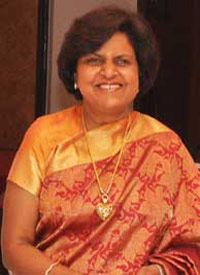SHE LEADS - REKHA MODY

Enhancing women’s political leadership is essential to building a strong democracy and global presence for India in the 21st century. Studies show that the higher level of women’s political participation and representation raise attention to women’s issues in general.
Women in high leadership positions in governments across the globe have demonstrated to have positive impacts in many areas of development resulting in lower levels of inequality and increased confidence in national governments. The World Economic Forum found that woman’s political leadership correlates to wider economic impacts and that the advancement on gender equity has positive economic outcomes for all. The key impacts of women in elected offices are higher educational attainment for women and girls, increased labor force participation and wages.
They have also demonstrated to have positive outcomes in improving health and civil rights. So, equal participation and representation of women in politics and decision making bodies is not just a demand for democracy but a necessary pre-condition for bringing women’s interests in the forefront.
Some countries are leading the path towards a higher number of women in Parliament. According to the data published by Inter-Parliamentary Union (IPU), Rwanda, Cuba and UAE are on the top of the list with more women in Parliament than men, while Sweden ranks number seventh (46.1%). India is at the 148th position among 193 countries ranked on the basis of the percentage of women members in National Parliament. Among the SAARC countries also India ranks in the lower positions, only ahead of Sri Lanka and Maldives.
In India, gender has emerged as a fundamental axis of democracy, alongside caste, class, region, religion and ethnicity. In the general elections of 2019, 67.18% of women electorate in India voted, showing an improvement from 59.4% in 2014. However, the increased female voter turnout did not automatically translate into women’s increased representation in the country’s Parliament and State Assemblies. Of the 8,049 women contestants, only 78 of them were sworn as members of the 17th Lok Sabha. This is the highest number of women MPs in India thus far.
While the low representation of women in Parliament and other decision-making bodies is compromising India’s development, the increase in women candidates in Parliament over last two decades also indicates the growing enthusiasm of women to enter the politics. There is a need for a comprehensive approach to women’s leadership that not only benefits communities but also leads to improved quality of discussion and outcomes in terms of legislations, policies and budgets. In several countries quotas have been used to increase the number of women in the Parliament. In India, Women’s Reservation Bill seeking increased representation of women in the Parliament is pending since 1996.
Some of the common myths around women not entering politics are lack of willingness and competence, but the fact remains that they don’t have sufficient access to the political spaces. Women need to be encouraged, empowered and supported in becoming strong political leaders. In this backdrop, She Leads programme has been conceptualized to help women become authentic and effective leaders and to increase their engagement and impact at higher levels of governance.

